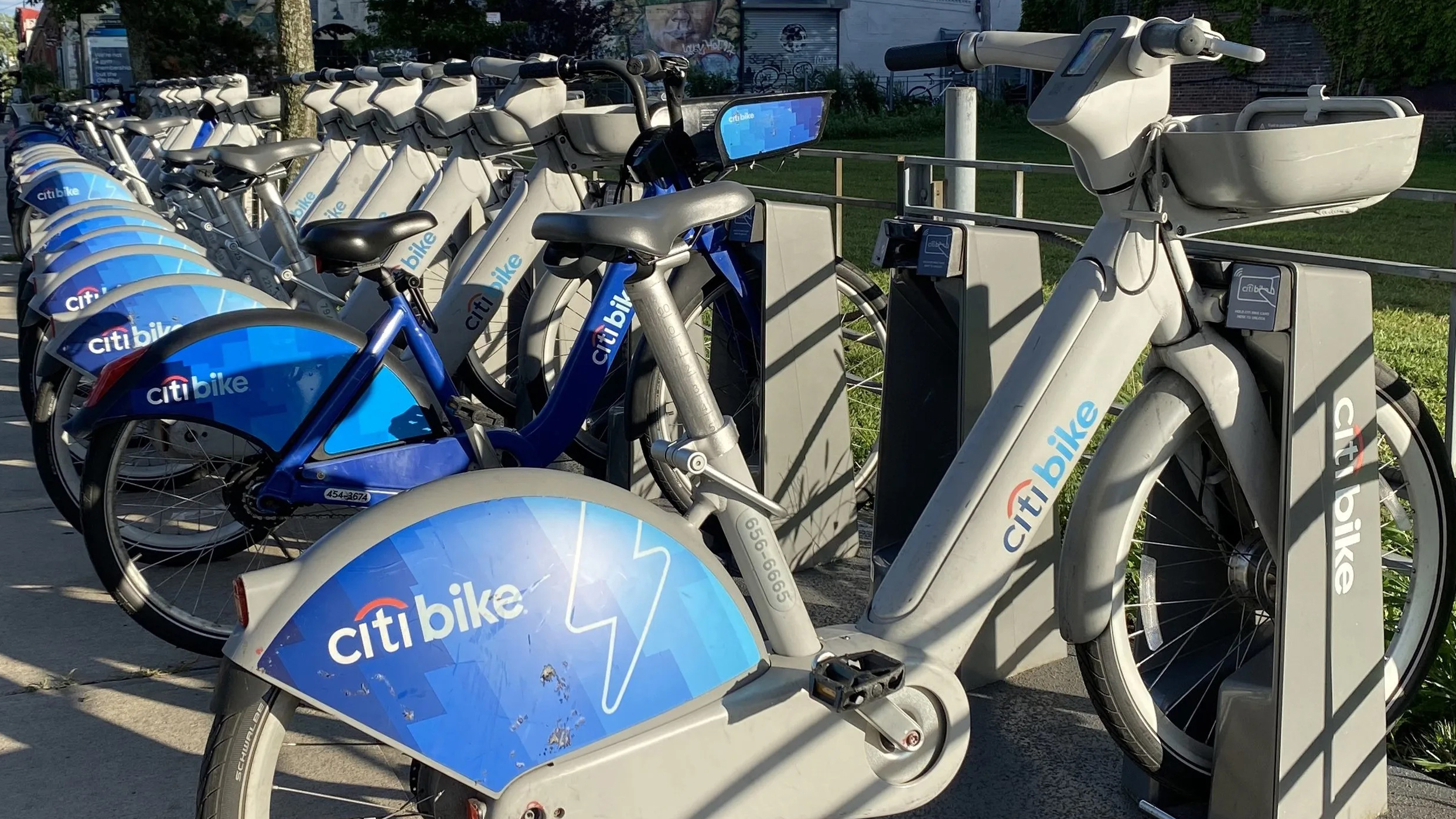Citi Bike is public transit.
That's the message behind Council Member Lincoln Restler's new bill to cap the cost of an electric Citi Bike ride at the cost of a subway or bus trip.
Under Restler's proposal, Citi Bike members would not pay more than the MTA's intra-city transit fare for any e-bike ride under an hour or any "acoustic" Citi Bike ride under two hours — treating bike-share as a public good rather than an amenity.
“Bike-share is now a part of the fabric of transit in New York City. People decide where they’re going to live, where they’re going to work, you know, who they’re going to date, based on Citi Bike convenience,” Restler (D-Brooklyn) told Streetsblog on Friday.
The MTA single-trip bus or subway is currently $2.90 — far less than the whopping $7.20 Citi Bike members pay for a half-hour e-bike ride. Citi Bike annual memberships cost $220 per person, or $200 for members who sign up through the "Lyft Pink" program.
Citi Bike has operated at no cost to city taxpayers since its launch in 2013. Funding comes from Lyft and its naming rights deal with Citi. By aligning bike-share fees with transit, Restler's proposal sets a high bar for the next phase of Citi Bike's growth and expansion — pointing towards a world where bike-share runs at a per-rider loss like public transit and highways and roads.
Lower e-bike fares will require public investment one way or another — either by subsidizing the system as it currently operates or, Restler suggested, by funding underground electrical work to reduce the need for resource- and labor-intensive manual battery swaps.
"Their model has changed a lot with the proliferation of e-bikes. Because the batteries don't automatically recharge, Lyft has a not-so-small fleet of drivers with vans all across the boroughs swapping out batteries," he said. "It's totally bonkers that that our most sustainable form of transit requires a fleet of cars to swap out batteries to get recharged."
Lyft won't say how much it costs to run Citi Bike, but a fleet of shared e-bikes likely isn't cheap — the bikes cost money to build and maintain and experience more use and therefore more wear and tear than non-electric bikes. Right now Lyft assumes all of those costs — whereas any city funding would be subjected to the political process and approval of the mayor and City Council.
Right now private investment, not public funding, fuels bike-share growth in New York City. Bike-share hasn't had to rely on grants or the City Council's whims to keep operating. But that means Lyft can set the prices and raise fares whenever it wants — as it has twice this year.
"The two price increases that we've experienced are making it much harder for people to use e-bikes multiple times a day, multiple days a week," Restler said.
I love CitiBike, but costs of e-bike rides have skyrocketed to up to $10 per ride. I’m introducing a bill to cap e-bike rides at the cost of a subway fare.
— Lincoln Restler (@LincolnRestler) September 13, 2024
Bike share is an essential part of transit in NYC. It needs to be affordable & accessible for all.https://t.co/rpdJPcCtPC
City leaders including Mayor Adams and Transportation Commissioner Ydanis Rodriguez previously endorsed public subsidies for bike-share, but the concept hasn't gone anywhere under their leadership.
Because the e-bikes get more use, however, they seem to offer a greater incentive for potential riders — who might otherwise opt to travel by car — than non-electric Citi Bike bikes, which, at $0 to ride for Citi Bike members for trips under 45 minutes, are competitively priced with transit and for-hire vehicles.
The city negotiated e-bike caps of 26-cents-per-minute for members and 36 cents for non-members when it renewed the company's contract last year, but the current fees still deter potential riders, according to NYU Faculty Fellow Marcel Moran.
"Citi Bike now, outside of membership, is prohibitively expensive [and even] with the membership is ... no longer really as competitive at that price point with transit. You can have a 15-minute bike ride that all of a sudden is more than the subway fare or the bus fare," Moran said. "Short of public subsidy, managing a large e-bike-based system cannot get to a price point that's accessible,
Cities Boston and Washington, D.C. paid Lyft for all the bikes and docks in their bike-share systems, and hired Lyft separately to run operations. The municipalities have more power to set fares to be more in line with mass transit, which can mean running at a loss.
"Bike-share is transport. Transport is something that we believe the government should invest into a degree to make it functional and financially sustainable — the same way we do with transit," Moran said. "Transit does not break even. It functions only because of government subsidy. We believe that's a really meaningful use of public funds because of all the benefits of transit connectivity and sustainability."
Restler's bill would take effect in 2029 — when (or should that be if?) the Department of Transportation and Lyft renew the company's operating agreement, which expires that year.
The company plugged two of its bike-share stations into the electric grid for in-station charging this year, but won't see cost savings from the technology until it electrifies 600 stations total, the rep said.
Restler's bill was first reported by Gothamist.






